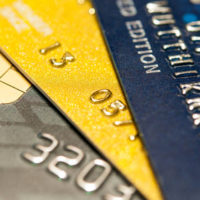Theft of Credit Card Information

Credit card theft can be divided into two separate categories. The first is when the credit card is physically present during the theft. This might occur if the defendant allegedly steals the card or changes the address on the cardholder’s account so that a separate new card is sent to the defendant’s address. However, fraud can occur even without the physical card. Many purchases, online purchases in particular, can be made with only the credit card number, expiration date, and CVV code. The number of credit card records exposed during data breaches has fallen dramatically in recent years, from 64.4 million in 2014 to just 800,000 in 2015, according to Bankrate. However, the most common types of credit card theft do not occur during large-scale, high-skill data breaches of major credit card and security companies.
Common Types of Credit Card Fraud
Skimming devices, which quickly take your credit card information with a single swipe, are used by waiters, bartenders, and salesclerks. The skimmer device is just a few inches across and can store everything needed to access a person’s credit card funds. Skimmers can also be secretly placed on gas station pumps, or a credit card reader may be switched at a store checkout lane with one to which a thief has access. The original offender may likely sell the information they gather to another party, who then creates a credit card with that information and sells it to a third party that uses the credit card to purchase items. Any and all of these three parties can be charged with credit card fraud. Additionally, hacking or phishing malware may be used to collect a person’s credit card information, which can either be sold to create a new credit card, or the credit card number may simply be used to make online purchases.
The Serious Implications of Credit Card Theft Charges
Being accused of credit card theft can have serious implications, even before a suspect is convicted. WTVR recently reported on a restaurant employee in Chesterfield County, Virginia who has been accused of stealing credit card information from patrons of the restaurant. She immediately lost her job and the media quickly reported on the case in order to warn other residents in the area to review their credit card statements. Unfortunately, anyone who has been accused of credit card theft is likely to have their career put at risk, and be made a public example of by the police and the press. Credit card theft is considered grand larceny under Virginia statute § 18.2-192. Grand larceny can be punished by up to 12 months in jail and a fine of up to $2,500, or by one to 20 years in prison. And, each count of credit card theft can be charged as a separate offense.
Contact a Lawyer Today
If you are under investigation for credit card theft or have been charged with credit card theft, call the Leesburg, Fairfax, Winchester, or Manassas criminal defense attorneys of Simms Showers, LLP at 703-771-4671 today. We will help you throughout each step of your case.
Resource:
bankrate.com/finance/credit-cards/5-ways-thieves-steal-credit-card-data-1.aspx
Disclaimer: This legal alert is provided for general information purposes only and is not a substitute for legal advice particular to your situation. No recipients of this memo should act or refrain from acting solely on the basis of this memorandum without seeking professional legal counsel. Simms Showers LLP expressly disclaims all liability relating to actions taken or not taken based solely on the content of this memorandum. Please contact Caleb Kershner or Ben Mann at cak@simmsshowerslaw.com, wbm@simmsshowerslaw.com, or (703) 771-4671 for greater details concerning how this information may affect you.
